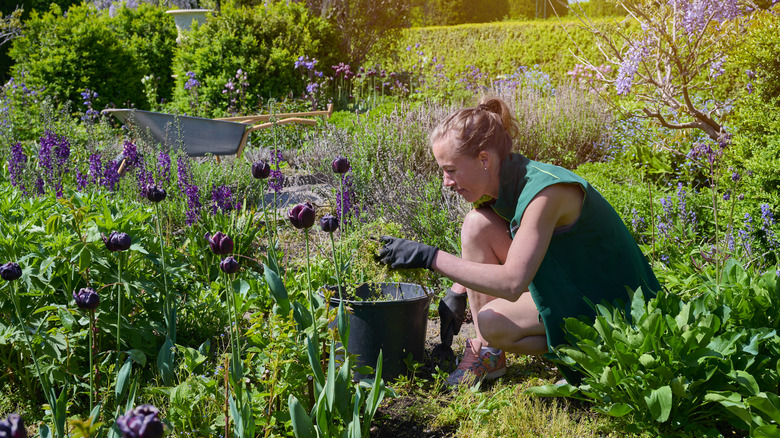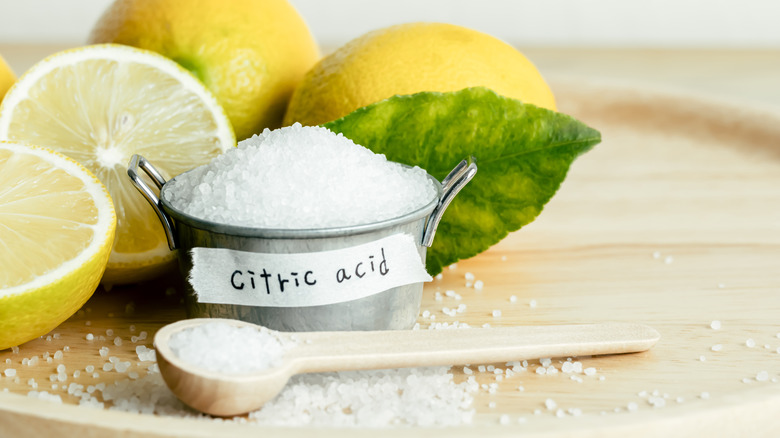A Common Kitchen Ingredient Is All You Need To Get Rid Of Weeds In A Pinch
More and more gardeners are becoming averse to using harsh synthetic treatments to kill unwanted plants — read: weeds — popping up between rows of luscious lettuce or crowding their carrots and radishes. Pulling them out by hand is fine if you have a container garden; it's not so much fun if you're gardening on an acre of land. Some natural, organic alternatives are promising as weed killers, from baking soda and vinegar to using rubbing alcohol to destroy weeds to lemon juice. The latter is readily available — you probably have a few lemons in your fruit bowl right now — and safe. It may not be the most effective option, but it's the grab-and-go killer you need if running to the hardware store or waiting for an Amazon delivery to arrive means weeds hinder your day's harvest.
Have you ever squeezed juice from a lemon by hand with a cut finger? That stinging sensation comes from the citric acid in lemons — a five to eight percent concentration. When it comes to killing plants, the citric acid in lemon juice dries out and burns the outer layers of a plant's leaves, resulting in widespread cellular destruction. Unable to function effectively (for example, photosynthesis is intruppted), most plants quickly die. Lemon juice is, essentially, a burn-down herbicide — in the same camp as weed killers that have iron chelate, acetic acid (vinegar), or clove oil as their active ingredient.
It's all in the citric acid
Scientific research into citric acid's efficacy dates back to at least the early 1990s. A 1991/1992 organic herbicide patent held by ECOVAL Corp states that adding citric acid enhanced the effect of the acetic acid in the solution. In a paper published in a 2016 issue of Buletin Penelitian Tanaman Rempah dan Obat, researchers found that a combination of acetic acid and citric acid killed broadleaf weeds (for example, dandelion, plantain, and chickweed) at least as well as a 2,4-D amine herbicide. Another study published in Weed Technology in 2017 showed a citric acid and garlic mix killed young broadleaf weeds better than all other organic compounds tested, including acetic acid and clove oil. A 2022 Agriculture study revealed citric acid counteracted the weakening effect of iron in herbicides.
Many commercial weed-killer manufacturers include lemon juice, citric acid, or another citrus skin extract, d-limonene, in their solutions. Their drive to create the powerful solution you need to put an end to pest plants proves the humble fruit's strength. However, before you go spraying lemon juice all over your yard, there are some less positive reports to consider. For one, this tangy tonic might mess with the delicate balance of compounds in your soil and lower the pH levels, creating conditions unfavorable for all plant life, not just weeds. Try not to get it in your eyes or on your skin, either. Worse, lemon juice as a weed killer might not work at all.
How to use lemon juice as weed killer
When Ellen Jacquart of Midwest Invasive Plant Network sprayed garlic mustard plants with a mixture of vinegar and lemon juice, they wilted but didn't die. Researchers behind a 2021 Horticulturae study found lemon juice failed to keep winter bluegrass weeds at bay. Thankfully, gardeners are anything if not experimental; they try things out to see if they work. The easiest way to make your own citric acid-powered plant pest terminator at home is to cut a lemon in half and squeeze it over the leaves of the weeds you want gone until they're saturated. A slightly more complicated alternative is juicing five lemons and pouring the juice into a spray bottle.
Ready-to-use lemon juice works just as well. A 4-ounce bottle of 100% lemon juice costs $9.00 from Cheeky. Walmart sells a 15-ounce bottle of ReaLemon for $3.62. You can combine it with kitchen vinegar — 1 cup lemon juice and 1 cup vinegar in a gallon of water or just a 1:1 mix of vinegar and juice. You might have to reapply the next day, and you can expect the weeds to wilt and die anywhere between two hours and two days. Wait for a sunny day over 75 degrees Fahrenheit to squeeze or spray for maximum effect. Lemon juice is an indiscriminate killer, so it's best used on weeds growing in walkways, pavements, and driveways. Citric acid can also deface marble, granite, and metal.



